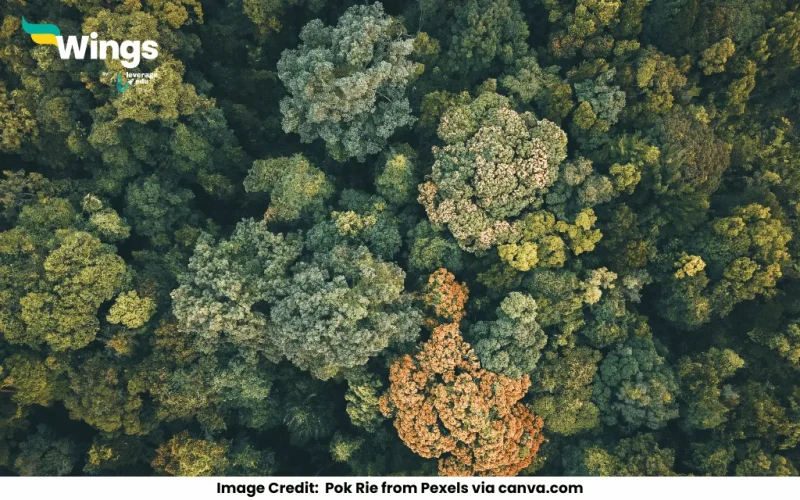Biodiversity conservation is crucial for maintaining the balance of ecosystems. To effectively protect wildlife and natural habitats, it is important to understand key environmental terms such as wildlife sanctuary, biosphere reserve, zoo, endangered species, extinct species, flora, and fauna. Below is a detailed differentiation between these commonly used terms in the field of conservation.
(a) Difference Between Wildlife Sanctuary and Biosphere Reserve
Both wildlife sanctuaries and biosphere reserves are protected areas, but they differ in their size, purpose, and the level of human intervention allowed.
| Feature | Wildlife Sanctuary | Biosphere Reserve |
| Definition | A wildlife sanctuary is a protected area where wild animals are conserved in their natural habitat without human interference. | A biosphere reserve is a larger protected area that includes wildlife sanctuaries, national parks, and human settlements to conserve biodiversity at a broader level. |
| Purpose | To provide safe habitats for animals, preventing hunting, poaching, and habitat destruction. | To maintain ecological balance and conserve the entire ecosystem, including plants, animals, and local communities. |
| Human Activity | Limited human activity such as controlled tourism and grazing is allowed. | Divided into three zones: Core Zone (no human activity), Buffer Zone (limited human activity), and Transition Zone (sustainable human settlements). |
| Size | Smaller in comparison to biosphere reserves. | Much larger and covers multiple ecosystems. |
| Example | Sariska Wildlife Sanctuary (Rajasthan), Mudumalai Wildlife Sanctuary (Tamil Nadu). | Nilgiri Biosphere Reserve (Tamil Nadu, Kerala, Karnataka), Sunderbans Biosphere Reserve (West Bengal). |
(b) Difference Between Zoo and Wildlife Sanctuary
Both zoos and wildlife sanctuaries protect animals, but they differ in how animals are kept and their natural surroundings.
| Feature | Zoo | Wildlife Sanctuary |
| Definition | A zoo is a facility where animals are kept in enclosures for education, research, and public display. | A wildlife sanctuary is a natural area where animals are protected in their natural habitat. |
| Habitat | Artificially created habitat with cages, enclosures, or glass walls. | Natural habitat with minimal human interference. |
| Purpose | Primarily for educational and entertainment purposes, as well as breeding programs for endangered species. | Conservation of wildlife by providing a safe and free-roaming environment. |
| Freedom of Animals | Animals are confined to enclosures. | Animals can roam freely within the sanctuary’s boundaries. |
| Example | Delhi Zoo, Mysore Zoo. | Kaziranga Wildlife Sanctuary (Assam), Gir Wildlife Sanctuary (Gujarat). |
(c) Difference Between Endangered and Extinct Species
Species conservation efforts categorise species based on their population status. Two important terms in this context are endangered and extinct species.
| Feature | Endangered Species | Extinct Species |
| Definition | Endangered species are those that are at high risk of becoming extinct due to habitat loss, poaching, or other factors. | Extinct species are those that no longer exist anywhere on Earth. |
| Causes | Habitat destruction, deforestation, poaching, climate change, pollution, and disease. | Excessive hunting, habitat destruction, environmental changes, and natural disasters. |
| Possibility of Recovery | Conservation efforts like breeding programs and habitat protection can help increase their numbers. | Cannot be revived once completely extinct. |
| Example | Bengal Tiger, Giant Panda, Asian Elephant. | Dodo, Passenger Pigeon, Woolly Mammoth. |
(d) Difference Between Flora and Fauna
Flora and fauna are the essential components of an ecosystem, where flora refers to plant life and fauna refers to animal life.
| Feature | Flora | Fauna |
| Definition | Flora refers to all plant species, including trees, shrubs, flowers, and grasses, found in a particular region. | Fauna refers to all animal species, including mammals, birds, reptiles, amphibians, and insects, found in a particular region. |
| Examples | Mangroves, Oak trees, Cactus, Rose plants, and Algae. | Bengal Tiger, Indian Elephant, Peacocks, Snakes, and Butterflies. |
| Influencing Factors | Climate, soil quality, water availability, and human activity. | Availability of food, habitat conditions, predators, and climate. |
| Role in Ecosystem | Produces oxygen, provides food, and maintains ecological balance. | Helps in pollination, seed dispersal, and maintaining predator-prey relationships. |
Conservation efforts aim to protect and restore wildlife and natural ecosystems. Understanding the differences between wildlife sanctuaries and biosphere reserves helps in recognizing their role in biodiversity conservation. Differentiating between endangered and extinct species highlights the urgent need for conservation efforts. Similarly, recognizing the role of flora and fauna in ecosystems ensures that plant and animal life are preserved for future generations. By spreading awareness and supporting conservation programs, we can contribute to maintaining ecological balance and protecting the natural world.
Common Doubts


 One app for all your study abroad needs
One app for all your study abroad needs











 60,000+ students trusted us with their dreams. Take the first step today!
60,000+ students trusted us with their dreams. Take the first step today!